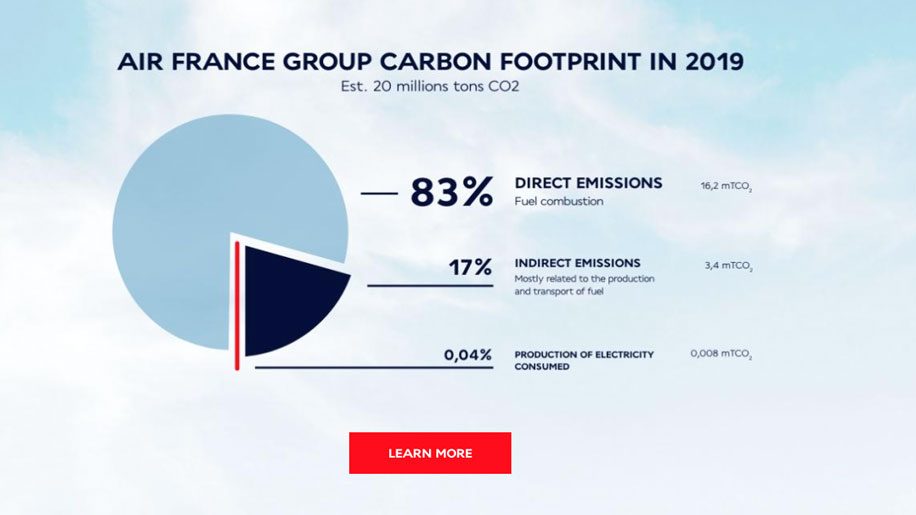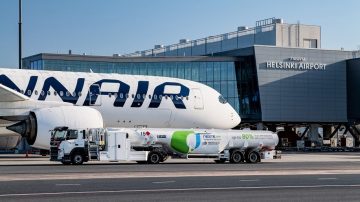
Air France has launched a new CO2 emissions reduction strategy called ‘Air France ACT’.
Building on earlier commitments, this new strategy sees the airline aim by 2030 for a reduction in CO2 emissions of 30 per cent per passenger/km compared to 2019; a reduction in emissions of 12 per cent in absolute terms.
The aim excludes “offsetting” and corresponds to a 12 per cent reduction in the company’s total emissions between 2019 and 2030, in line with expected changes in activity, after a six per cent reduction achieved between 2005 and 2019.
The new strategy has three priorities:
- Reducing the direct emissions generated by Air France operations
- Reducing indirect emissions generated upstream and downstream of the company’s activities
- Supporting projects that absorb CO2 from the atmosphere
The airline says that “Decarbonising aviation will be difficult and will take time. This process relies on close cooperation between the different stakeholders: aircraft manufacturers, engine manufacturers, fuel suppliers, airports, air traffic control, public authorities, research institutes and academia.”
Air France says it is still “working to define a precise and verifiable decarbonisation trajectory for 2050, based on a set of hypotheses – notably concerning an evolution of traffic – which may vary. Therefore, this is an evolving process, guided by the ambition to be in line with the scientific benchmarks, as is the case for the trajectory for 2030.”
There are five priority actions in Air France ACT to reduce and avoid CO2 emissions
- Fleet renewal with new-generation aircraft such as the A320, A220, Airbus A350 which, since they are more fuel-efficient, emit up to 25 per cent less CO2, and have a noise footprint reduced by 33 per cent on average. Air France says that by 2030, these aircraft will make up 70 per cent of its fleet compared to seven per cent currently.
- Increased use of Sustainable Aviation Fuel (SAF). Since the beginning of this year, Air France has been incorporating the equivalent of one per cent sustainable aviation fuel on all its flights departing from France. By 2030, the company aims to incorporate at least 10 per cent SAF on all its flights, and 63 per cent in 2050.
- Eco-piloting techniques: taxiing using only one of the engines whenever possible, optimised flight paths using artificial intelligence, continuous descent in cooperation with the air traffic control authorities, to name but a few. These initiatives, made possible by the efforts of Air France flight crews trained in these practices, reduce CO2 emissions by two to three per cent on average over the year.
- Introduction of a more responsible catering offer, to reduce the carbon footprint. On board flights and in the lounges, Air France “favours local, seasonal produce whenever possible”. The company also offers customers a pre-selection of dishes before the flight in the long-haul business cabin to reduce food waste. In addition, by the end of 2022, Air France will have eliminated 90 per cent of single-use plastics compared to 2018, after having replaced in 2019 plastic cups, cutlery and stirrers with sustainable alternatives.
- Developing intermodal transport, to offer low-carbon transport alternatives for short distance journeys, notably within a reinforced partnership between Air France and French national rail operator SNCF.
The Air France-KLM Corporate SAF programme was extended in 2020 with the following partners: ABN Amro, Accenture, Arcadis B.V., Arcadis N.V., Loyens & Loeff, Air Traffic Control The Netherlands (LVNL), Microsoft, the Ministry of Infrastructure and the Environment, Neste, the Royal Netherlands Aerospace Centre (NLR), PGGM, Schiphol Group, SHV Energy, Södra, the University of Delft, Lavazza, Finco Fuel, Hans Grohe SE and IMS Gear. This supports corporate customers by giving them the means to invest in SAF beyond regulatory requirements.












